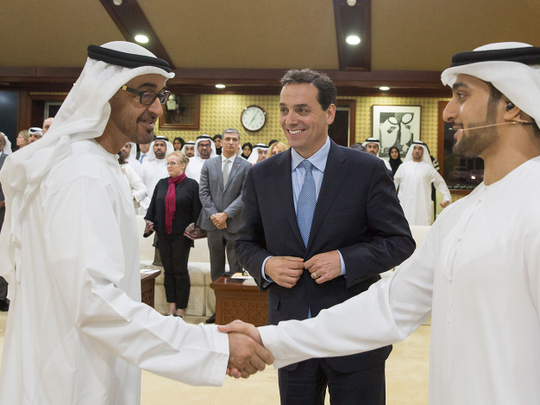
Abu Dhabi: The businesses that succeed in the future will be the ones that fundamentally shift the way they think about motivating their employees, best-selling author and speaker Daniel Pink told the majlis of His Highness Shaikh Mohammad Bin Zayed Al Nahyan, Abu Dhabi Crown Prince and Deputy Supreme Commander of the UAE Armed Forces, on Wednesday.
Pink, renowned for his research and writing about business and human behaviour, told the audience the future of work is about building businesses that foster both humanity and productivity.
Shaikh Mohammad attended the lecture, part of His Highness’s effort to spread the spirit of knowledge and learning in the United Arab Emirates, by inviting renowned scholars, experts, officials and entrepreneurs to speak at his majlis at Al Bateen Palace in Abu Dhabi.
In his lecture, themed “The New Science of Human Motivation”, Pink said in the past, people relied heavily on their intuition in their understanding of motivation, but now innovation has become something of a science with 50 years of vigorous behavioural research backing it.
Pink, who has been named one of the top 15 business thinkers in the world, said that one overarching finding that behavioural scientific research supports is that controlling contingent reward — that is if you do something, you’ll get a reward in return — are only effective for simple, short-term tasks. This strategy, which terms “if-then rewards”, don’t pay off at all in the case of complex, long-term tasks.
“Human beings love rewards, they get our attention. You offer somebody a big reward for something and you have their attention,” he said, asserting that this works perfectly for simple tasks.
“Once the task called for even rudimentary cognitive skill, greater reward led to poorer performance,” he said, referring to an experiment that ran counter to common wisdom that the greater the reward, the greater the performance.
For complex tasks, that won’t work, he said, adding that the solution isn’t bigger reward or greater punishment.
“As economies become based more on human capacity and technical know-how, this kind of simple rewards don’t work,” he said, adding that research shows in order to achieve long-term goals “you have to pay people fairly” but it’s not a sustaining motivator nonetheless.
Once an organisation has got this out of the way. There are three main things an organisation should think about in terms of motivating its employees. The first of them being purpose. “Am I making a contribution in my day-to-day work,” he said, asserting that a purpose doesn’t have to be a great, overarching one, it could be a simple purpose.
He said an experiment about having an open-kitchen in a restaurant and its impact on the quality of food. “It turns out when the cooks could see the customers, the quality of the food improves,” he said, adding that cooks immediately saw the result and the purpose of their work when they saw the customer which led in turn to improving the quality of food.
The second being mastery of the work and whether the employee is making progress in his work. The third part, he said, is to make sure that employees enjoy a sense of autonomy as they carry out their tasks.
Responding to a question about how parents can motivate their children to read, Pink said the best way for the parents to convince their children to read is that for parents themselves to read. “Children don’t listen to what their parents say,” he said. “But children watch closely what their parents do” and imitate them.
Pink concluded his lecture by pointing out that by nature humans are autonomous, self-directed and curious. “Are their people who don’t have a sense of motivation? Yes,” he said. “Is that part of their nature, absolutely not.”
Pink is the author of five provocative books about business and management, which have been translated into 34 languages. From 1995 to 1997, he was the chief speech writer for US Vice-President Al Gore. He advises global corporations as well as start-ups on recruiting, innovation and work practices. He’s also the host of the National Geographic Channel programme Crowd Control which premiered in November 2014. His books include, “To Sell is Human” and “The Whole New Mind”.







